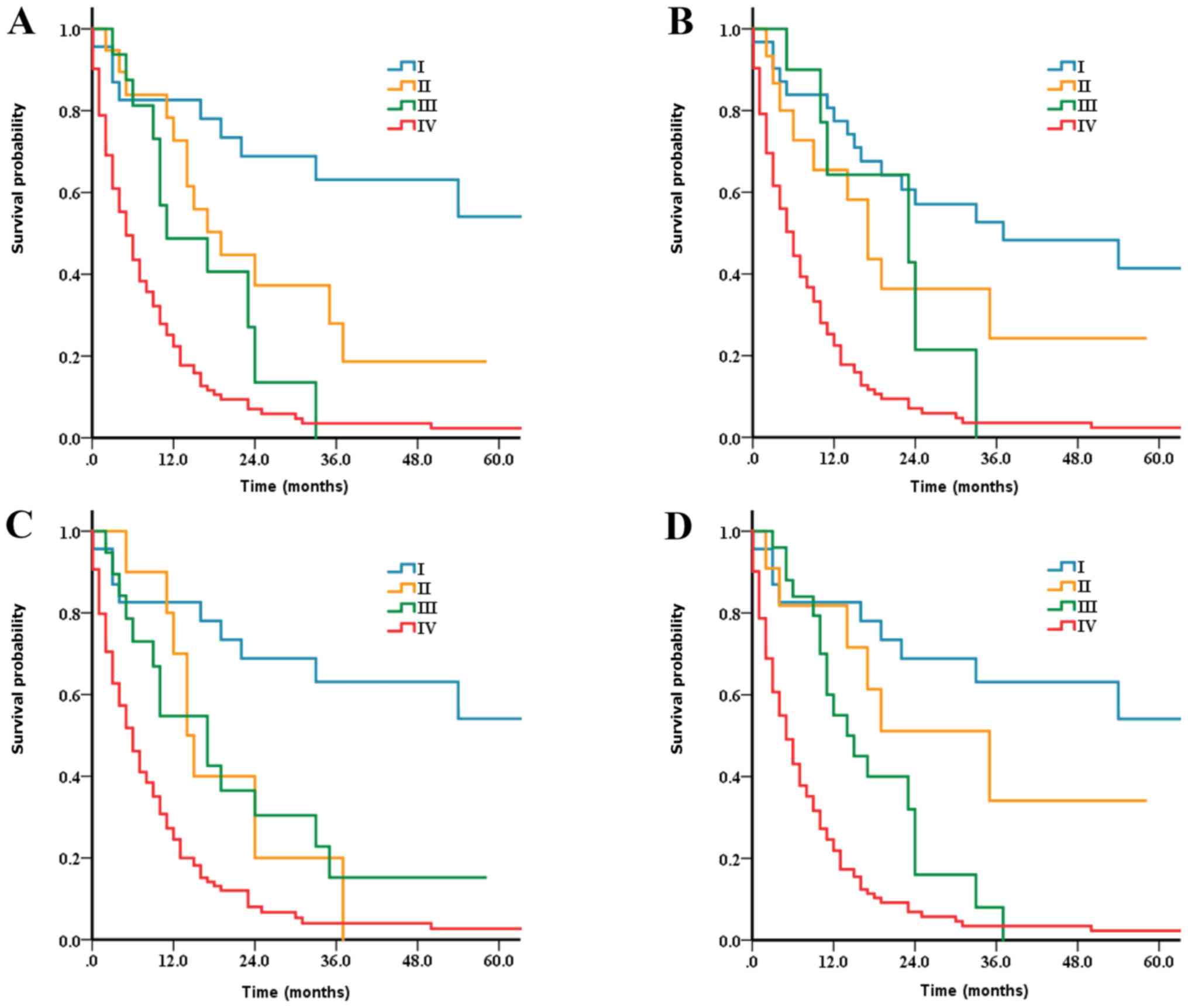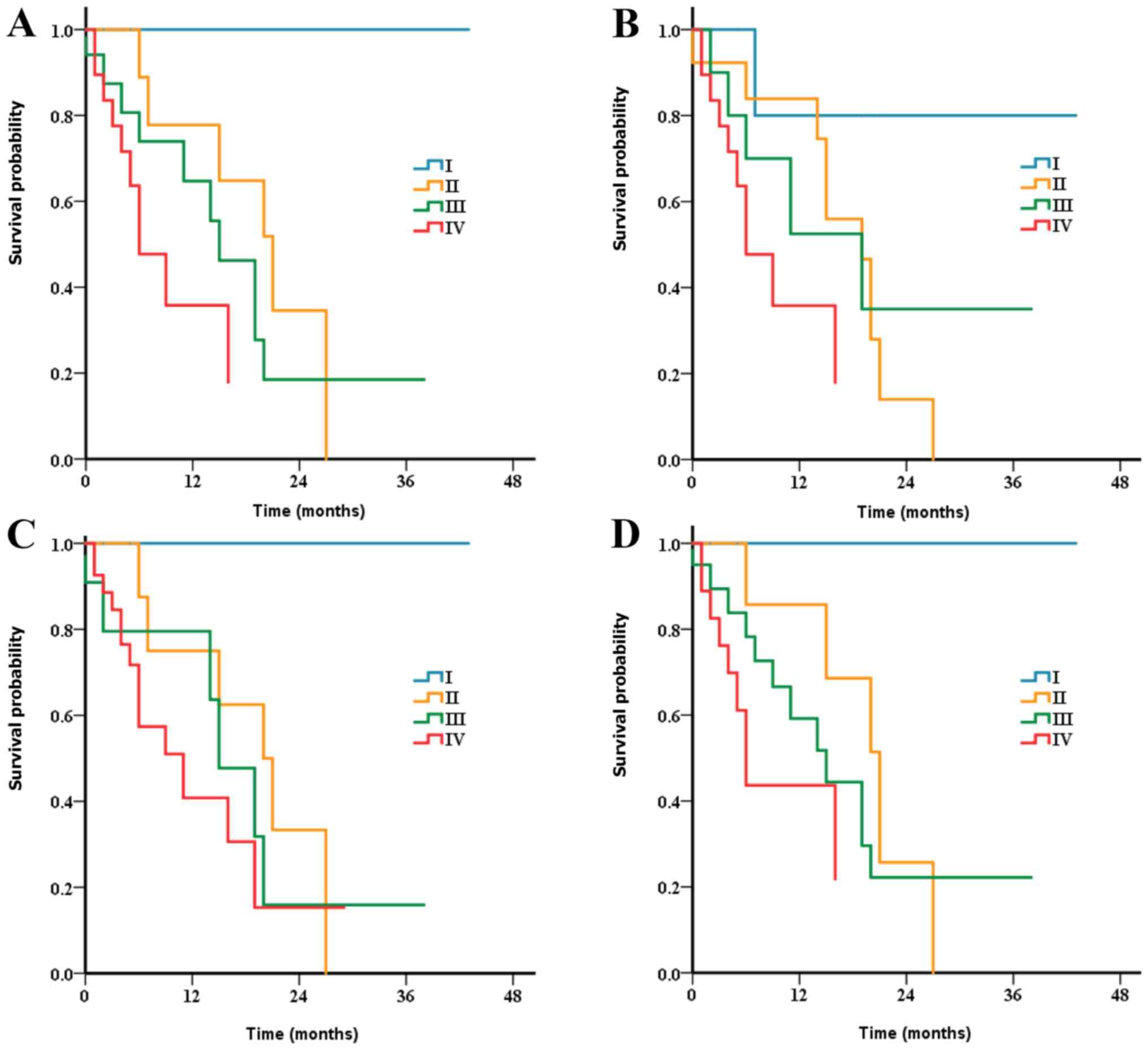|
1
|
Modlin IM and Sandor A: An analysis of
8305 cases of carcinoid tumors. Cancer. 79:813–829. 1997.
View Article : Google Scholar : PubMed/NCBI
|
|
2
|
Gastrointestinal Pathology Study Group of
Korean Society of Pathologists, ; Cho MY, Kim JM, Sohn JH, Kim MJ,
Kim KM, Kim WH, Kim H, Kook MC, Park DY, et al: Current trends of
the incidence and pathological diagnosis of gastroenteropancreatic
neuroendocrine tumors (GEP-NETs) in Korea 2000–2009: Multicenter
study. Cancer Res Treat. 44:157–165. 2012. View Article : Google Scholar : PubMed/NCBI
|
|
3
|
Lee CG, Lim YJ, Park SJ, Jang BI, Choi SR,
Kim JK, Kim YT, Cho JY, Yang CH, Chun HJ, et al: The clinical
features and treatment modality of esophageal neuroendocrine
tumors: A multicenter study in Korea. BMC Cancer. 14:5692014.
View Article : Google Scholar : PubMed/NCBI
|
|
4
|
Wang KL, Yang Q, Cleary KR, Swisher SG,
Correa AM, Komaki R, Ajani JA, Rashid A, Hamilton SR and Wu TT: The
significance of neuroendocrine differentiation in adenocarcinoma of
the esophagus and esophagogastric junction after preoperative
chemoradiation. Cancer. 107:1467–1474. 2006. View Article : Google Scholar : PubMed/NCBI
|
|
5
|
Huang Q, Wu H, Nie L, Shi J, Lebenthal A,
Chen J, Sun Q, Yang J, Huang L and Ye Q: Primary high-grade
neuroendocrine carcinoma of the esophagus: A clinicopathologic and
immunohistochemical study of 42 resection cases. Am J Surg Pathol.
37:467–483. 2013. View Article : Google Scholar : PubMed/NCBI
|
|
6
|
Deng HY, Ni PZ, Wang YC, Wang WP and Chen
LQ: Neuroendocrine carcinoma of the esophagus: Clinical
characteristics and prognostic evaluation of 49 cases with surgical
resection. J Thorac Dis. 8:1250–1256. 2016. View Article : Google Scholar : PubMed/NCBI
|
|
7
|
Maru DM, Khurana H, Rashid A, Correa AM,
Anandasabapathy S, Krishnan S, Komaki R, Ajani JA, Swisher SG and
Hofstetter WL: Retrospective study of clinicopathologic features
and prognosis of high-grade neuroendocrine carcinoma of the
esophagus. Am J Surg Pathol. 32:1404–1411. 2008. View Article : Google Scholar : PubMed/NCBI
|
|
8
|
Deng HY, Li G, Luo J, Li XR, Alai G and
Lin YD: The role of surgery in treating resectable limited disease
of esophageal neuroendocrine carcinoma. World J Surg. 42:2428–2436.
2018. View Article : Google Scholar : PubMed/NCBI
|
|
9
|
Okuma HS, Iwasa S, Shoji H, Takashima A,
Okita N, Honma Y, Kato K, Hamaguchi T, Yamada Y and Shimada Y:
Irinotecan plus cisplatin in patients with extensive-disease poorly
differentiated neuroendocrine carcinoma of the esophagus.
Anticancer Res. 34:5037–5041. 2014.PubMed/NCBI
|
|
10
|
Rice TW, Ishwaran H, Ferguson MK,
Blackstone EH and Goldstraw P: Cancer of the esophagus and
esophagogastric junction: An eighth edition staging primer. J
Thorac Oncol. 12:36–42. 2017. View Article : Google Scholar : PubMed/NCBI
|
|
11
|
Rindi G, Falconi M, Klersy C, Albarello L,
Boninsegna L, Buchler MW, Capella C, Caplin M, Couvelard A,
Doglioni C, et al: TNM staging of neoplasms of the endocrine
pancreas: Results from a large international cohort study. J Natl
Cancer Inst. 104:764–777. 2012. View Article : Google Scholar : PubMed/NCBI
|
|
12
|
Rice TW, Ishwaran H, Hofstetter WL, Kelsen
DP, Apperson-Hansen C and Blackstone EH; Worldwide Esophageal
Cancer Collaboration Investigators, : Recommendations for
pathologic staging (pTNM) of cancer of the esophagus and
esophagogastric junction for the 8th edition AJCC/UICC staging
manuals. Dis Esophagus. 29:897–905. 2016. View Article : Google Scholar : PubMed/NCBI
|
|
13
|
Rice TW, Ishwaran H, Kelsen DP, Hofstetter
WL, Apperson-Hansen C and Blackstone EH; Worldwide Esophageal
Cancer Collaboration Investigators, : Recommendations for
neoadjuvant pathologic staging (ypTNM) of cancer of the esophagus
and esophagogastric junction for the 8th edition AJCC/UICC staging
manuals. Dis Esophagus. 29:906–912. 2016. View Article : Google Scholar : PubMed/NCBI
|
|
14
|
Rice TW, Ishwaran H, Blackstone EH,
Hofstetter WL, Kelsen DP and Apperson-Hansen C; Worldwide
Esophageal Cancer Collaboration Investigators, : Recommendations
for clinical staging (cTNM) of cancer of the esophagus and
esophagogastric junction for the 8th edition AJCC/UICC staging
manuals. Dis Esophagus. 29:913–919. 2016. View Article : Google Scholar : PubMed/NCBI
|
|
15
|
Luo G, Javed A, Strosberg JR, Jin K, Zhang
Y, Liu C, Xu J, Soares K, Weiss MJ, Zheng L, et al: Modified
staging classification for pancreatic neuroendocrine tumors on the
basis of the American joint committee on cancer and European
neuroendocrine tumor society systems. J Clin Oncol. 35:274–280.
2017. View Article : Google Scholar : PubMed/NCBI
|
|
16
|
Kim MK, Warner RR, Roayaie S, Harpaz N,
Ward SC, Itzkowitz S and Wisnivesky JP: Revised staging
classification improves outcome prediction for small intestinal
neuroendocrine tumors. J Clin Oncol. 31:3776–3781. 2013. View Article : Google Scholar : PubMed/NCBI
|
|
17
|
Martin JA, Warner RR, Wisnivesky JP and
Kim MK: Improving survival prognostication of
gastroenteropancreatic neuroendocrine neoplasms: Revised staging
criteria. Eur J Cancer. 76:197–204. 2017. View Article : Google Scholar : PubMed/NCBI
|
|
18
|
RStudio Team, . RStudio: Integrated
Development for R. RStudio, Inc., Boston, MA, 2015. http://www.rstudio.com/
|
|
19
|
R Core Team, . R: a language and
environment for statistical computing. R Foundation for Statistical
Computing, Vienna, 2012. http://www.R-project.org/
|
|
20
|
Cuccurullo V and Mansi L: AJCC cancer
staging handbook: From the AJCC cancer staging manual (7th
edition). Eur J Nuclear Med Mol Imaging. 38:408. 2011. View Article : Google Scholar
|
















